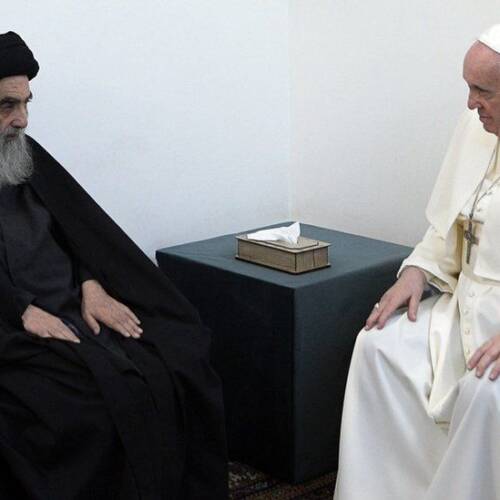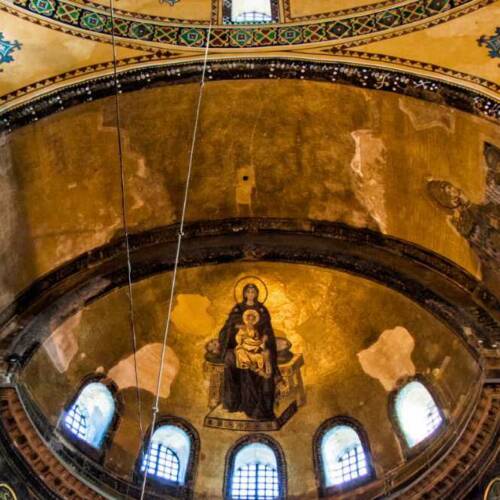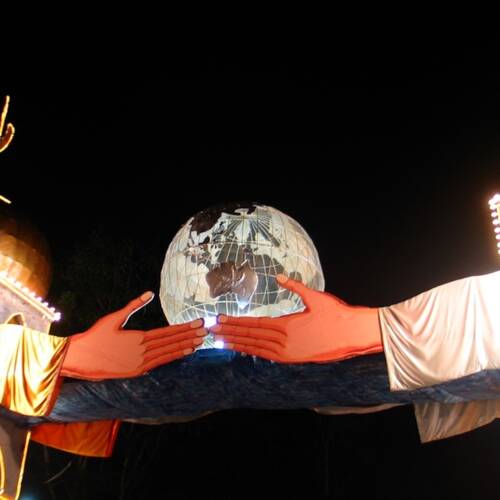
The Birth Story of Jesus, son of Mary, daughter of Hannah (pbut) in the Holy Qur’an
25 Dec 2021In the Qur’an, Prophet Jesus (pbuh) is granted the honour of introducing himself – and he does so magnanimously. Miraculous words from an infant child in his cradle; words that give me goosebumps every time I hear them: “And peace is on me, on the day I was born, on the day I die, and on the day I am raised alive.”
Jesus son of Mary, or Isa ibn Maryam (pbut), is renowned as one of the most venerated Prophets in Islam. The story of his miraculous virgin birth by Lady Mary (pbuh), followed by a life filled with asceticism, trials, devotion, and a mysterious disappearance, touches and inspires the hearts of billions across the world as they strive to emulate the way of his heart and teachings. Despite differences in perception of his distinct role, he is a unifying thread that intertwines between the three Abrahamic religions: being of Jewish descent, venerated as the one who brought the Bible (Injeel) to the people, and being the last major Prophet before the advent of the final Messenger (s) in Islam.
Yet there is an air of intrigue that surrounds him due to his emphasised role in “The Second Coming,” and the element of his continual life that exists in both Christian and Islamic world-views. Many Muslims believe he will reappear at the end of days alongside Imam Mahdi, or “the Mahdi”, prior to the Day of Judgement. In other words – his prophetic mission is not yet done. Like all Prophets, Jesus (pbuh) in Islam is a Prophet who testifies to the Unity and Oneness of God’s message that exists throughout the ages. Yet the adoration of his name throughout the ages makes His testimony at the end of times that much more powerful – in the same way he was a unifying force that was born with the name of peace, his end mission is said also to unify the worlds of differences between those who revere him, in the name of peace.
Hence, at this time of year when people all over the world are revering his name and celebrating his birth, it is beneficial to know of the events that lead up to his miraculous birth, and how these events as narrated in the Qur’an, inform us of the meaning and the very essence of faith – how they too prepared for the coming of this magnanimous Prophet; the divine will that ensured his was a legacy never to be forgotten.
The Lead up to Jesus’ (pbuh) Birth
The lead up to Jesus’ (pbuh) birth has been recorded as a time of divine signs and miracles. In the Qur’an, we see how God establishes His authority prior to his coming, so that when he arrives, there could be no denial that this is the chosen Messenger of God. Yet God’s signs took time to unfold, because whilst the coming of the Messiah was known – God’s plan was unknown to even Jesus’ grandparents Imran and Hannah. It is reported that Allah revealed to Imran that a blessed boy would be granted him, who would have the ability to cure the blind, the leper and raise the dead. A magnanimous revelation indeed.
Hence, Imran informed his wife Hannah, and when she became pregnant with Mary (pbuh), she of course believed in the revelation: that her child was to be a boy. But when she delivered a female, the Qur’an depicts her surprise, and entails God’s own response to her words, “‘O my Lord! Verily I have delivered a female’ And Allah was most knowing of what she delivered, and the male is not like the female [for a female will not be a Prophet]. “And I have named her Mary, and I seek refuge for her in You and [for] her descendants from Satan, the expelled [from the mercy of Allah].” [Quran 3:36]
This part of Jesus’ (pbuh) birth story is often brushed over, but in essence this encapsulates the very meaning of faith pertaining to the arrival of the blessed Prophet. Allah revealed a message which did not unfold in the way that Imran and Lady Hannah had expected. They must have been overjoyed to know they were to be the parents of the coming Messiah. So how easy must it have been to lose faith and become disheartened at giving birth to a female? It would have been easy for Lady Hannah to question the revelation. It may have been difficult for her not to be disappointed, to wonder why, and to not question Allah’s divine decree. Yet Allah Himself responds to her: “And Allah knows better what has been delivered.” (3:36) In essence, this was only a test, but one with beautiful divine wisdom for generations to come. Here, Lady Hannah responds to this test remarkably and beautifully: “And I have named her Mary, and I seek refuge for her in You and [for] her descendants from Satan, the expelled [from the mercy of Allah].” How could Lady Hannah have known in that moment, that the blessed and pure Virgin Mary – the only female to be mentioned in the Qur’an, would be the child she held in her arms? The Virgin Mary, who even today, in the year 2021, it is rare to come across an individual who has not heard her name and heard of the reverence of her divine legacy.
This was Lady Hannah’s testimony of pure submission, and the above is the result of her patience and trust: events did not unfold in the way she understood the revelation to be, but Allah makes it clear – He knows better what His revelation entails. For He knows past, present and future, and what we see are but glimpses through pinholes of the momentary in the system of God’s eternity.
This is where Lady Hannah gives Lady Mary in service to the temple, for she had already made an oath that her child would be in the service to God. Despite Lady Hannah’s testimony – a female is not like a male – and knowing that a female does not hold any place in the temple, Lady Hannah’s conviction of faith leads her to persist in the path of giving her child to God.
By honouring Lady Hannah and Mary, Allah makes it very clear the prestige that lies in the blessing of being a pious lady dedicated to God. Allah too makes it clear that the soul is genderless, and the one who is meant for His blessed service shall undertake it, irrespective of their gender. Allah sets a barometer here, which also undermines cultural propositions pertaining to the place of a woman. Allah makes it clear to societies that were derogatory and undermining to the roles of females in religion – that Mary was a blessed, and chosen child. He did so, so that generations would see the value of being committed to His service irrespective of their personhood or circumstances. Allah then reiterates His reverence for Lady Mary and her family, by emphasizing her story through the revelation of the Qur’an. This is the timeless, faithful love of God. Indeed, He never fails in His promises.
Lady Hannah ends her beautiful testimony by seeking refuge from Satan – perhaps she was asking for refuge from the ignorance of believing we know better than Him. She asks for the protection of all of Mary’s descendants too – her testimony to God that she still is firmly rooted in the belief of the prophecy. This is in stark contrast to those who Allah references as “deniers” in the Qur’an, those who belittled the wisdom of God that they could not understand, and proceeded to deny even as the divine signs of the Prophets unfolded. Lady Hannah was tested with uncertainty at one of the most vulnerable points of a woman’s life – the very moment she gave birth. And she passes her test with honour and pure gratitude. Hence, the pure, saintly, and Virgin Mary came from a household that was committed only to the service of God.
Lady Mary
Allah in all His glory, decided that the coming of Jesus – what we can now say in hindsight was a magnanimous turning point in the history of human kind – had to be through the miracle of Lady Mary’s purity first. With His meticulous planning, stage by stage, from the foretelling to Imran, and the eventual virgin birth – God set up evidential proofs to honour the position of His servants. To the extent that now, when we look back in history, all we see is the honour these individuals have been granted for their beautiful and pure submission to God. But the trials that took them there, were trials which required unwavering faith in the unseen, patience through that which they did not know, and trust that Allah’s plan would always prevail. If today, the pure and loving teachings of Jesus son of Mary are renowned across the world – it is because of the exemplary sacrifices of the self, by individuals like Lady Hannah and Mary.
The story continues, and the Qur’an says: “So her Lord accepted her with a good acceptance and caused her grow up in a good manner, and gave her into the charge of Zakariya…”
God makes it clear that a servant’s will for servitude to Him is one thing, however His acceptance of it is another. We can never be sure of God’s acceptance of our efforts. However, in the case of Lady Mary, God emphasises how He accepted Mary with a ‘good acceptance’, gave her a good upbringing, and He protected her through Zakariya.
Hence, Lady Mary grew up in the cloister of the temple, in pure piety and servitude to God. Prophet Zakariya would find her in her room despite having not left, with summer fruits in winter, and winter fruits in the summer. So he would ask her, ‘Who gave you this?’ She would say, “It is from Allah. Verily Allah provides for whomsoever He wants without measure.” (3:37) This verse once again illustrates Lady Mary’s reality is her belief in the unseen; her unwavering conviction, and certitude that God will always provide a means for His servants irrespective of their circumstances. Lady Mary emphasises that Allah does this for “whomsoever he wants”, and thus the element of her being a chosen woman in her own right is emphasised.
Later, when Lady Mary is informed of her virginal pregnancy and expected birth of the blessed Prophet Jesus, the angels said: “O Mary! Verily Allah has chosen you and purified you and chosen you above the women of the worlds.” (3:42) now it is clear that Lady Maryam holds such a position, that she is in communication with the angels, and her position before God is announced to her. Again – we realise here the essence of faith. Allah Himself raised Mary in the temple, with blessed glad tidings, and kept her pure. But then Allah Himself tells her: now your test is going to be the very piety I raised you with, and honoured you for.
Imagine – a lady who comes from a Prophetic household, whose upbringing is revelation, and whose very esteem lies in her purity… is now pregnant with an anonymous baby. The anguish Lady Maryam feels is made clear in the Qur’an, as she weeps poetically at the pangs of birth, wishing such a day had not come: “She cried, “Oh, how I wish I had died before this, and was a thing long forgotten!” (19:23) at this point, she has no idea how she is going to make it through this ordeal, let alone to face the people upon her return. Yet Allah Himself takes the position of reassuring her heart, “So a voice reassured her from below her, “Do not grieve! Your Lord has provided a stream at your feet.” (19:24) Despite her evidential distress, and how the Qur’an depicts her very real emotions – she trusted and obeyed Him.
What distinguishes the Servants of God who Allah enlists as “Chosen” in the Qur’an? Tests and circumstances did not deter them from their unwavering conviction. Throughout the Qur’an, you see God tests them with everything that is near and dear to them. Sometimes God raises their esteem, only to be crushed. And sometimes their very own hopes and wishes for themselves remain unfulfilled. And sometimes they are ordered to endure outright humiliation. Yet out of sincerity for the love of God, with the purity of their belief, and through each passing moment – they continued on: testifying there is only one God. Not only testifying, but loving Him with all their being as they divinely submitted, truly believing He knew better than they ever could. And Allah recompensed them with the comfort of His own self – “God has purchased the souls and property of the believers in exchange for Paradise.” (9:111)
Lady Mary’s tests in this regard would continue until the awaited birth of the blessed Prophet Jesus, who is revered in every corner of the world today because of her submission to God. This is how God’s honour works – in His own time, according to His own plans, in His own way. For Allah makes it clear, time and time again, through His most noble and blessed servants – our purpose is only submission. Nobody has the right to intervene with His will. Despite the plotting and scheming that took place to deter the birth of this blessed child – here we have an infant child in his cradle, his first act in life being a divine intervention and miracle, as he defends his mother’s very honour, and speaks revelation. Thus, he announces – in case the divine Signs that have been revealed generationally until now were not clear – indeed it is he who has been born miraculously: Isa son of Maryam. Son of the Blessed Virgin mother, daughter of the blessed Imran and Hannah.
And so peace be upon him, on the day he was born, on the day he dies, and on the day he is raised to life. He makes his introduction in the world very clear: قَالَ إِنِّى عَبْدُ ٱللَّهِ – “He said: I am indeed a slave of Allah.” (19:30)
And this is what made Prophet Jesus who he is: despite His many miracles, despite a lifetime so unique in story, despite His life of pure piety and ascetism, despite His rank as one of the greatest of Prophets, despite having the opportunity to live two lives – one to establish His prophethood towards the Oneness of God, and one to utilise the proof of His very existence to once again point to the Oneness of God, in a time when people will be of little faith, and much hope will be lost. Through him, God makes it clear: Jesus in all his glory, attains his glory, simply because He is – truly, essentially, and absolutely – the pure Servant of God. This is why his glory until today remains: He is a pure sign pointing to the miracles of His divine will. He is a reminder to us, to also turn back to identifying only as the slaves of Allah the Almighty, the Wise.
“And We sent, following in their footsteps, Jesus, the son of Mary, confirming that which came before him in the Torah; and We gave him the Gospel, in which was guidance and light and confirming that which preceded it of the Torah as guidance and instruction for the righteous.” [5:46]
Blessed is the Lord who sent proof after proof, generation after generation, in order to establish His authority, His love, and His kingdom. Blessed is the Lord who cared so much for His creation, that He repeatedly sent Sign after Sign in order to awaken our hearts and reap the benefits of His Love through gratitude, by following the examples of His beautiful messengers. Blessed is the Lord who demonstrated to us through Prophet Jesus, that miracles are but a small affair for God; what matters is one’s submission. Blessed is the Lord of Isa son of Maryam: the tender-hearted, kind, merciful, loving servant of God.















